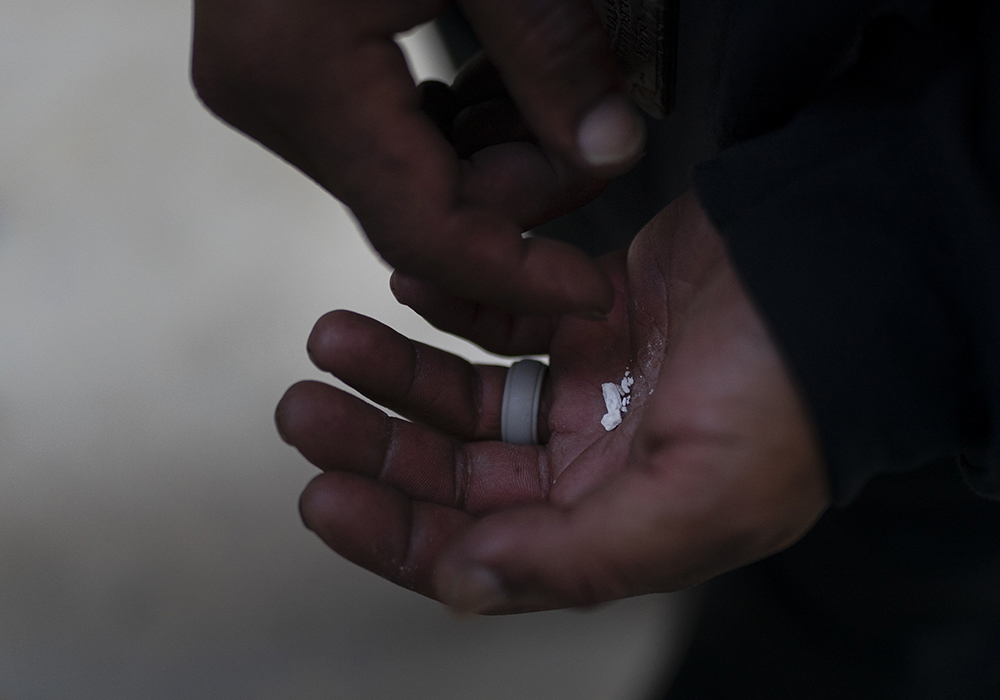
A homeless person holds pieces of fentanyl Aug. 18, 2022, in Los Angeles. Last year saw an overall increase in drug overdose deaths in the U.S. In New Jersey there have been more than 3,000 fatalities annually due to drug overdoses. (AP photo/Jae C. Hong)
Robert Carter knows well the hell of addiction. He used just about everything to get high, including intravenous cocaine. After years of falling asleep terrified about the next day and several stints in jail, he finally — "because my higher power gave me one more shot" — got clean.
A new partnership between the Archdiocese of Newark and the New Jersey Reentry Corporation, where Carter serves as chief operating officer, aims to assist those struggling with various forms of addiction find hope sooner than he did.
"There are no words to describe how important this collaboration with the archdiocese is," Carter said during a recent NCR interview. "For those who don't know where to turn, it offers them the spiritual support but also a way to get practical help."
Effective July 1 and backed by Newark Cardinal Joseph Tobin, the initiative is straightforward and features an educational component for priests and a treatment referral program. It emerged as the opioid crisis, exacerbated by the pandemic, remains at epidemic levels.
Last year saw an overall increase in drug overdose deaths in the United States, and in New Jersey there have been more than 3,000 fatalities annually due to drug overdoses. Synthetic opioids, including fentanyl, are the most common drugs involved in drug overdose deaths.
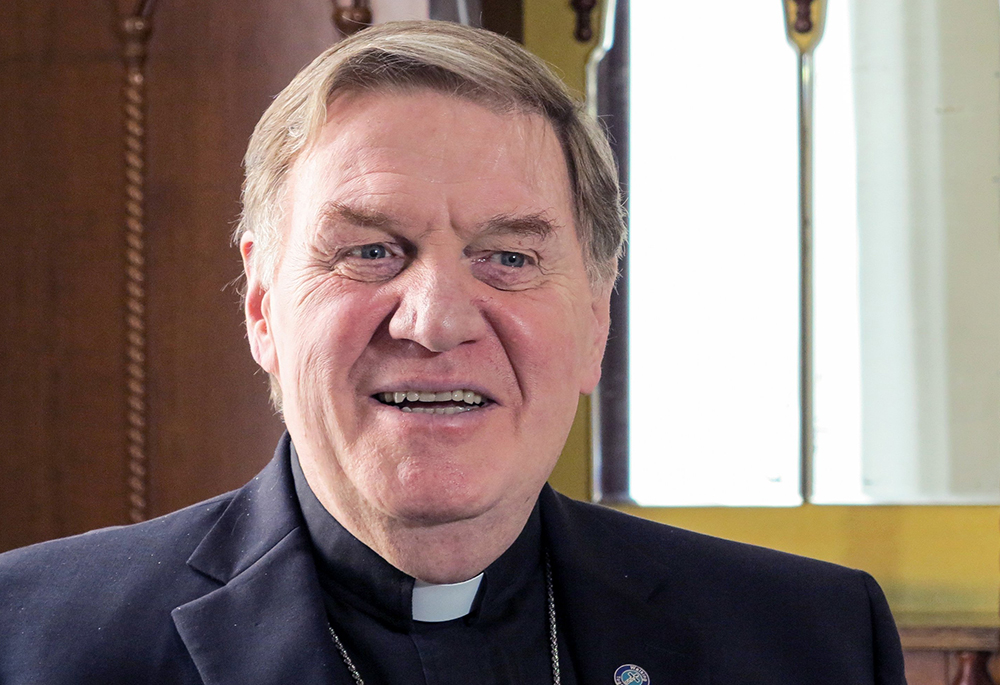
Cardinal Joseph Tobin of Newark, New Jersey, speaks to Catholic News Service in Rome Jan. 25 about the 10th anniversary of Pope Francis' pontificate. (CNS/Robert Duncan)
Tobin, a recovering alcoholic who has been sober for nearly four decades, told NCR many U.S. dioceses have programs for people suffering from substance use disorders and their families, and numerous parishes host 12-step programs.
But the cardinal said he's not aware of a diocese that's engaged in a partnership "on the scale we are embarking upon with the New Jersey Reentry Corporation." Organizers think the alliance could serve as a model for other episcopates.
Jim McGreevey is a former governor of New Jersey and executive director of New Jersey Reentry Corporation, or NJRC, a nonprofit that helps people with substance use disorder and those who've been incarcerated receive the necessary services to rebuild their lives.
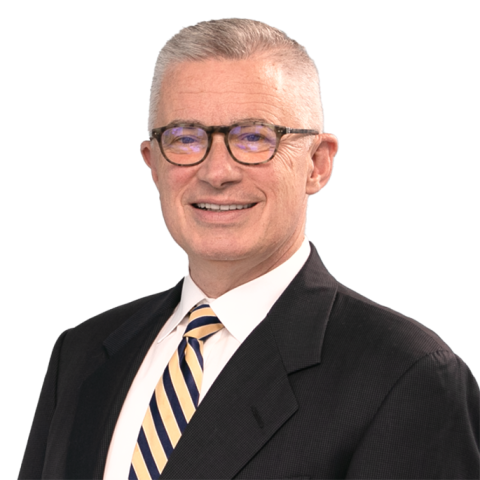
Jim McGreevey (Courtesy of New Jersey Reentry Corporation)
McGreevey said people living with a dangerous addiction frequently do not enter treatment until they are in crisis — because they have been arrested and are involved in the court system or have experienced an addiction-related medical emergency.
"The goal here is to move help further upstream," said McGreevey, "when individuals who feel ashamed, feel vulnerable, feel disoriented if not broken, turn to someone they trust."
And for many, he said, that person is a spiritual leader, such as a priest.
"The church is where people go when they don't know where else to go," said Fr. Timothy Graff, director of the Newark archdiocesan Social Concerns Office and coordinator of the new partnership. "It is where they go to find some meaning and understanding and hope."
Through the voluntary, NJRC-run training sessions — the first was held online June 22 — priests learn about the scope of the opioid crisis, especially the devastation wrought by fentanyl, receive an overview of treatment options and the referral process, and review their appropriate role as they offer pastoral support.
When priests in the archdiocese encounter families and those with substance use disorder, they can provide information about the New Jersey Reentry Corporation. Within 48 hours of a referral, NJRC staff ensure individuals receive a clinical assessment and guide them to addiction treatment services.
A fast response at this stage is critical, said Carter. "The window of willingness for participants is so small," he said. "When making the decision to get clean, that sometimes lasts only a couple hours or a day, and if they do decide to enter treatment, we want to act before they change their mind."
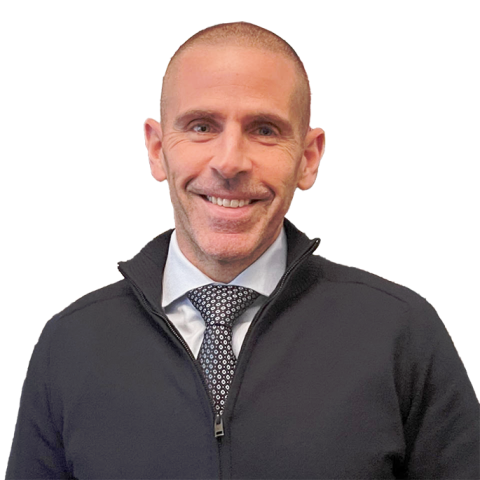
Robert Carter, chief operating officer of the New Jersey Reentry Corporation, said he knows firsthand the anguish of addiction. (Courtesy of New Jersey Reentry Corporation)
It is also imperative, Carter added, to have wraparound services. The New Jersey Reentry Corporation assists with a long-term treatment plan, and helps individuals obtain detoxification, the induction of anti-craving medications to aid in treating substance use, and residential or intensive outpatient treatment. Social workers link people with job training and employment.
McGreevey noted that family members may be the ones pursuing help on behalf of a loved one and similarly seek out their parish priest.
"The local county government or state might provide an array of phone numbers but they can become mind-numbing and unapproachable," he said. "The goal here is that this person you see every Sunday, that you trust, has a number that can connect you to a clinically licensed provider."
Dr. Ryan Sultan is an expert in addiction at the Department of Psychiatry at Columbia University Irving Medical Center and director of Integrative Psych in New York. He called the partnership model "fantastic."
"Religious leaders are trusted people in communities and for many the first point of contact for personal issues, including addiction," Sultan told NCR. "Helping religious leaders have an accurate understanding of addiction and the ability to provide appropriate referrals is a critical first step to move someone forward in recovery."
There also remains a stigma and sense of shame in some religious families when it comes to addiction, said McGreevey, which is another reason why it's imperative to educate priests.
"Education can help religious leaders better understand the nature of the disorder and dispel myths and stigma associated with it," said Sultan.
Advertisement
During the June online training, priests learned how fentanyl is "far harder to kick" than other drugs, said Carter.
Sultan explained that morphine is a first-generation opioid and "fairly strong" but that fentanyl is 100 times stronger. And the feel-good hit dopamine surge lasts a much shorter amount of time.
A graph of a fentanyl high, said Sultan, "would be a really tall and really skinny hill — you go straight up and then get dropped."
Priests receive some training in pastoral counseling and a few might attend a workshop on addiction, but for many priests their knowledge of substance use disorder, and opioids specifically, is limited, said Graff.
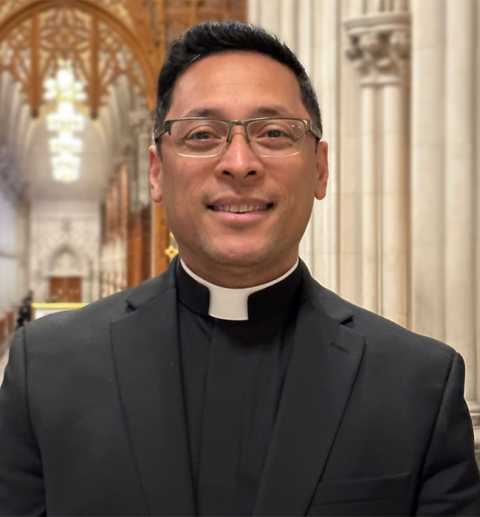
Fr. Bismarck Chau (Courtesy of Fr. Bismarck Chau)
Fr. Bismarck Chau, rector of the Cathedral Basilica of the Sacred Heart in Newark, was among about 20 priests who attended the initial online New Jersey Reentry Corporation training session.
Chau said he did not receive any education about ministering to people with addiction while in seminary and that the information in the session was immensely valuable.
"I think every priest should go through such a training, " said Chau.
He told NCR he does think it would be helpful to provide additional, more in-depth sessions for priests, given the complexities of addiction. Chau would like to learn more, for example, about how to identify someone who is under the influence of a drug and what patterns or behaviors they might display.
He said among the most important elements of the recent session was learning when and how to refer individuals to NJRC and about the proper role of a priest.
"The goal is not for the parish priest to serve as a clinician but to understand the nature of addiction, to be pastoral, to be compassionate, to offer spiritual understanding — and to say here is a resource," said McGreevey. "The family member or the person in addiction will be the one who makes that first, critical step by calling NJRC."
The nonprofit's staff help clients navigate Medicaid or private insurance to cover treatment costs, and Carter said during his five years with the organization, no one has been turned away for inability to pay.
"This partnership is an example of living out the Gospel and Pope Francis' call to go out to the margins, to the forgotten," said Chau. "Those suffering with addiction are certainly on the margins."
For Tobin, if the collaboration saves one life and contributes to the healing of a single family, "it will make a very meaningful difference."
"Many addicts turn to their faith community, to their parish and its pastor in desperate search for relief," said the cardinal. "Working together, the archdiocese and NJRC can save lives."




